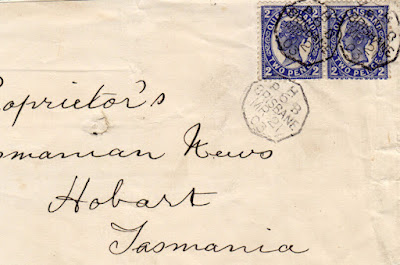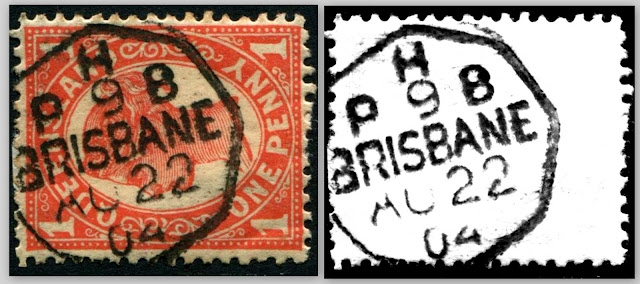This was a special series introduced for use on mail posted at the Brisbane General Post Office and is quite different from previous types. Octagonal in shape, measuring 21.5 to 23 mm between opposite points, they fall into four groups, with the letters
'H', 'O', 'T' and 'X' placed in the top angle. Immediately below is a code
number, flanked by the letters 'P' and 'B', 'BRISBANE' across the centre, and
the date in two lines below and the year in two figures. The top letters referred to four pillar boxes at the Brisbane General Post Office as
follows:
- 14(H) - (Home) mail intended for delivery in Queensland outside the Brisbane city delivery area. Codes H1 - H9 (October 1891 - January 1910)
- 14(O) - (Overseas) mail addressed beyond Australia. Codes O1 - O5 (November 1886 - October 1910)
- 14(T) - (Town) mail to the Brisbane delivery area. Codes T1 - T9 (15 August 1892 - 31 July 1905)
- 14(X) - (Intercolonial / Interstate) mail. Codes X1 - X7 (24 March 1888 - 22 August 1910)
Letters posted in the wrong box would, if the mistake was not picked up, be impressed with the wrong datestamp; this frequently
happened and they are well worth collecting.
An example of mail posted in the wrong box. It was posted in the 'H' box (mail intended for delivery in Queensland outside Brisbane) instead of the 'X' box (Interstate mail)
The Code letters represented a time code. The 30 implements had short lives and frequent replacement
of type was necessary. At least nine varieties of O1 and ten of T1 are known and varieties are discussed and shown HERE.
They were introduced in January 1886 and up to the end of 1895 the stamps were cancelled by
obliterators with the datestamps appearing elsewhere on the cover. They then came to be used to obliterate the stamps themselves and were in use for this purpose until October 1910. Most, but not all, of these pillar box codes are very common and I therefore only show a representative sample with the emphasis on covers and clear, complete examples where no covers have yet been seen.
Type 14(H) Codes are H1 - H9. Numerous varieties known. Dates range from 8 October 1891 - 27 January 1910 but dates before 1896 can really only be collected on cover. Rated Common - 4R
- Code H1 (22 August 1895 - 30 November 1908) rated Common - $5, $20 on cover
- Code H2 (10 February 1896 - 27 January 1910) rated 4R - $40, $60 on cover
- Code H3 (8 October 1891 - 7 August 1909) rated Common - $8, $100 on cover
- Code H4 (15 June 1896 - 2 December 1907) rated 3R - $35, $100 on cover
- Code H5 (25 June 1897 - 10 January 1909) rated 2R - $20
- Code H6 (3 June 1897 - 20 May 1905) rated Rare - $15, $100 on cover
- Code H7 (12 October 1897 - 1 July 1905) rated 4R
- Code H8 (2 April 1896 - 21 December 1906) rated Common - $8, $100 on cover
- Code H9 (21 January 1897 - 23 May 1905) rated Common - $8
Code H1
1895
1897
1902
1906
Brisbane date stamp type 14(H). Code H1. Dated 20 June 1906. Rated common
1907
Unknown year
---------------
Code H2
1896
1897
1909
1910
--------------
Code H3
1891
1906
----------------
Code H4
1896
Brisbane date stamp type 14(H). Code H4. Dated 15 June 1896. Rated 3R
Brisbane date stamp type 14(H). Code H4. Dated 22 July 1896. Rated 3R. Seen in the Queensland Stamp Collecting Facebook Group
1904
----------------
Code H5
1898
1902
---------------
Code H6
1899
1902
1903
Brisbane date stamp type 14(H). Code H6. Dated 21 March 1903. Rated rare. Seen in a private collection
1905
-------------
Code H7
1897
1898
Brisbane date stamp type 14(H). Code H7. Dated 31 August 1898. Rated 4R
1905
--------------
Code H8
1896
1898
1906
-----------------
Code 9
1898
1904




-1.jpg)
.webp)
-001.webp)



























.jpg)






No comments:
Post a Comment